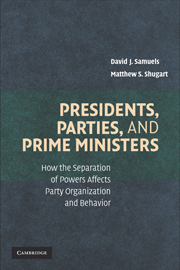 Presidents, Parties, and Prime Ministers
Presidents, Parties, and Prime Ministers Book contents
- Frontmatter
- Contents
- Preface and Acknowledgments
- Presidents, Parties, and Prime Ministers
- 1 Introduction
- 2 Political Parties in the Neo-Madisonian Theoretical Framework
- 3 Insiders and Outsiders
- 4 Constitutional Design and Intraparty Leadership Accountability
- 5 Electoral Separation of Purpose within Political Parties
- 6 The Impact of Constitutional Change on Party Organization and Behavior
- 7 Parties' “Presidential Dilemmas” in Brazil and Mexico
- 8 Presidents, Prime Ministers, and Mandate Representation
- 9 Conclusion
- References
- Index
9 - Conclusion
Published online by Cambridge University Press: 05 June 2012
- Frontmatter
- Contents
- Preface and Acknowledgments
- Presidents, Parties, and Prime Ministers
- 1 Introduction
- 2 Political Parties in the Neo-Madisonian Theoretical Framework
- 3 Insiders and Outsiders
- 4 Constitutional Design and Intraparty Leadership Accountability
- 5 Electoral Separation of Purpose within Political Parties
- 6 The Impact of Constitutional Change on Party Organization and Behavior
- 7 Parties' “Presidential Dilemmas” in Brazil and Mexico
- 8 Presidents, Prime Ministers, and Mandate Representation
- 9 Conclusion
- References
- Index
Summary
Constitutional systems with directly elected executives now comprise a majority of all democracies around the globe. However, the comparative study of political parties remains conceptually wedded to the European experience with parliamentary democracy. The notion that parties might be “presidentialized” is not, of course, new. In fact, the trend toward presidentialization identified in some of the literature (e.g. Poguntke and Webb eds. 2005a, 2005b) reflects a long-standing scholarly concern with parties' deafness to popular demands. This particular concern has deep roots, even in the West European parliamentary context – it goes back at least to Michels (1911 [1962]) if not before, and in some ways is also an extension of Kirchheimer's (1966) lament about the emergence of catch-all parties.
We do not deny that Parliamentary parties can become “presidentialized” in one sense, by becoming increasingly reliant on an individual leader. This too is not a new concern; Max Weber famously made this specific point in the early 20th century, pointing out that the problem had characterized 19th-century British parties (Weber 1958 [1919], 103–07). Clearly, political parties have failed to live up to the high standards scholars set for them ever since they have existed. Yet this reliance on an individual leader is more accurately identified as personalization than as presidentialization, and our notion of presidentialization differs fundamentally from the concept of personalization.
- Type
- Chapter
- Information
- Presidents, Parties, and Prime MinistersHow the Separation of Powers Affects Party Organization and Behavior, pp. 249 - 264Publisher: Cambridge University PressPrint publication year: 2010


